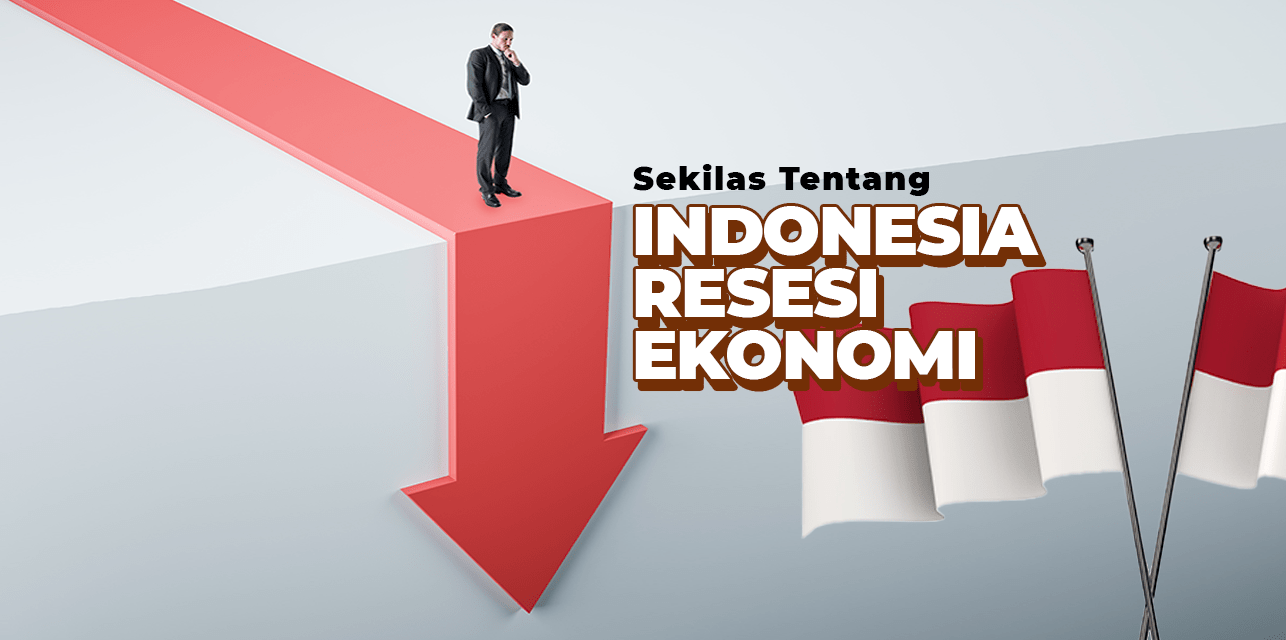Economic Recession at a glance
The definitions used by economists vary. Economists use the monthly business cycle of peaks and troughs designated by the National Bureau of Economic Research (NBER) to determine periods of expansion and contraction. The peaks and troughs in economic activity that began with the December 1854 trough. Economic recession is a period of economic downturn in general and is usually accompanied by a decline in the stock market, an increase in unemployment, and a decline in the housing market.Generally, recessions are less severe than depressions. The blame for a recession generally falls on the federal leadership, often either the president himself, the head of the Federal Reserve, or the entire administration. There are several commonly used definitions of recession. For example, journalists often describe a recession as two consecutive quarters of quarterly (inflation-adjusted) decline in real gross domestic product (GDP).
Economic Recession in Indonesia
And, we must admit that we were surprised to see an impressive 7.07 percent year-on-year (y/y) increase in Indonesia's economic growth in Q2-2021, well above our projections (and results that are very close to those disclosed by Indonesian policymakers, such as Coordinating Minister for Economic Affairs Airlangga Hartarto or Finance Minister Sri Mulyani Indrawati). This means that Indonesia has now finally – after exactly one year – has finally come out of the economic recession that began in Q2-2020 (the first recession since the Asian Financial Crisis in the late 1990s).This latest recession was caused by the strict social and business restrictions imposed – not only by the Indonesian government but also by various governments around the world – in response to the COVID-19 pandemic (which had officially reached Southeast Asia's largest economy in early March 2020). In addition, seeing scary news coverage of this deadly and contagious new virus (with an estimated infection death rate of between 3 and 4 percent – thankfully an example of misinformation released by the WHO) certainly scares people to come out. and consume (or travel) as usual.
It all led to a major decline in consumption (including tourism), production, investment, and trade around the world. It was Q2-2020 when Indonesia reached its lowest point in the COVID-19 crisis with this unprecedented decline in economic activity (recording a massive contraction of -5.32 percent y/y in Q2-2020). Positively, it means that Indonesia's GDP data for the second quarter of this year can enjoy a 'low base effect'.
And, this is indeed shown by Indonesia's economic growth rate of 7.07 percent in Q2-2021. The latest Indonesian GDP data also shows that, in the first half of 2021, Indonesia's economy grew by 3.10 percent (y/y) compared to the same six months of the previous year. This is a good performance given the circumstances (and it is something that is necessary for poverty alleviation). However, there are reasons to remain vigilant because the COVID-19 pandemic is not over yet; It may even be far from finished.
Causes of Economic Recession in Indonesia
2021 is a turbulent year for the Indonesian economy. After successfully exiting the recession in the second quarter of this year, the country was hit mercilessly by the outbreak of the Delta variant of COVID-19. The economic impact is devastating. Amid the Delta variant outbreak from July to August, authorities imposed emergency public mobility restrictions (PPKM) nationwide to curb infections. People were ordered to stay at home and effectively shut down most businesses, dealing a further blow to the country's struggling MSMEs. Domestic consumption and community activities decreased compared to the same period last year.As a result, Indonesia's economic growth in the third quarter slowed to only 3.51 percent. Furthermore, the Ministry of Investment/BKPM reported a decrease in foreign direct investment (FDI) in the period from July to September. It fell 2.7 percent to Rp103.2 trillion in the third quarter from the previous year. The pandemic outbreak wreaked havoc on the rapid annual growth of 19.6 percent seen in the previous quarter. Fortunately, since October 2021, COVID-19 cases have continued to decline. Bahlil Lahadalia, Minister of Investment/Head of BKPM stated that the decline was mostly due to many skilled workers from abroad who could not enter Indonesia to work on their respective projects due to PPKM.
The flow of imported and exported goods was also disrupted. Despite the challenges, Indonesia's FDI in the third quarter increased by 3.7 percent from 2020 of Rp216.7 trillion. By October, the situation was already beginning to be seen. Thanks to the perseverance of Indonesia's admirable frontline health workers, strict health protocols and aggressive vaccination programs, the outbreak was contained. The annual direct investment target of Rp659.4 trillion announced by President Joko Widodo has been achieved.
With only a few months left, Lahadalia is still optimistic that Indonesia can achieve economic growth of 5 percent YoY in the fourth quarter of 2021 as long as the target of Rp900 trillion is met. To encourage economic growth above 5 percent in 2022, Indonesia targets investment realization to reach IDR 1,200 trillion. To get it, the realization of both local and foreign investment must be increased to 22-23 percent.
The Impact of the Economic Recession in Indonesia
Since the beginning of June, Indonesia has experienced a staggering increase in COVID-19 infections with more than 50,000 cases identified in a single day in mid-July. This resurgence has prompted the government to introduce a stricter form of lockdown measures. The measures include the closure of shopping malls and restaurants, as well as requiring all non-essential and non-critical sectors to implement a 100% work-from-home policy, although shops catering to daily necessities are still allowed to operate for a period of time.Critical and essential sectors in this case include the health and utilities sectors, as well as certain processing industries The effects of the lockdown can already be seen through a recent report from IHS Markit, a London-based consulting firm that provides monthly reports on manufacturing activity around the world. Indonesia's Purchasing Manager's Index (PMI) fell sharply to 40.1 in the company's July report from 53.5 in June, or below the unchanged figure of 50.0. The contraction ended eight consecutive months of growth in the country's manufacturing sector as uncertainty surrounding a resurgence of COVID-19 cases reduced production and demand.
To deal with the resurgence of COVID-19 cases, the country is stepping up its economic recovery campaign efforts by expanding many of the programs introduced at the beginning of the pandemic, such as the income tax relief mentioned above, as well as introducing new policies such as additional tax exemptions on rental space for retailers. The vaccination campaign in Indonesia is also continuing, with nearly 50 million Indonesians having received their first vaccination and more than 22 million second doses out of a total target of 208 million.
Tips for Dealing with an Economic Recession
Here are some tips that can be done to deal with the economic recession that occurs. These tips are:Deleverage Before Decline
Companies with high levels of debt are particularly vulnerable during a recession, the study shows. In a 2017 study, Xavier Giroud (from MIT's Sloan School of Management) and Holger Mueller (from NYU's Stern School of Business) looked at the link between business closures and related unemployment and falling housing prices in various U.S. states. Overall, the more housing prices fall, the more consumer demand falls, driving an increase in business closures and higher unemployment.
But the researchers found that this effect was most pronounced among companies with the highest levels of debt. They divide companies based on whether they become more or less leveraged ahead of a recession, which is measured by changes in their debt-to-asset ratio. Most businesses that close due to falling demand have high leverage.
Focus on Decision Making
A company's performance during and after a recession depends not only on the decisions made, but also on who makes them. In a 2017 study, Raffaella Sadun (of Harvard Business School), Philippe Aghion (of Collège de France), Nicholas Bloom and Brian Lucking (of Stanford), and John Van Reenen (of MIT) examined how organizational structure affects a company's ability to navigate the downturn.
On the one hand, "the need to make difficult decisions may benefit centralized companies," the researchers wrote, because they have a better picture of the organization as a whole and their incentives are usually more aligned with the company's performance. On the other hand, decentralized companies may be better positioned to deal with macro shocks "as the value of local information increases."
Beyond layoffs
Some layoffs are inevitable in the decline; during the Great Recession, 2.1 million Americans were laid off in 2009 alone. However, companies emerging from the crisis in the strongest conditions rely less on layoffs to cut costs and more on improving operations, Ranjay Gulati and his colleagues found in their study of public companies.Investing in Technology
Why do companies invest in technology during a recession when money is tight? Economists theorize that it's because their opportunity cost is lower than good times. When the economy is in excellent condition, a company has every incentive to produce as much as possible; If it diverts resources to invest in new technology, it may leave money on the table. But when fewer people are willing to buy what you're selling, operations don't need to continue running at maximum capacity, which frees up operating budgets to fund IT initiatives without reducing sales.For that reason, adopting technology is cheaper, in a sense, during a recession. After knowing about Indonesia's own economic recession, what are the causes and how it has an overall impact on the individual and group economy, then you can also apply the tips that have been shared when facing the recession itself. In addition to Indonesia's economic recession, you can read the article Economic Recession globally through the Causes, Duration, and Impact of the Economic Recession.
 Last:
Last: 







